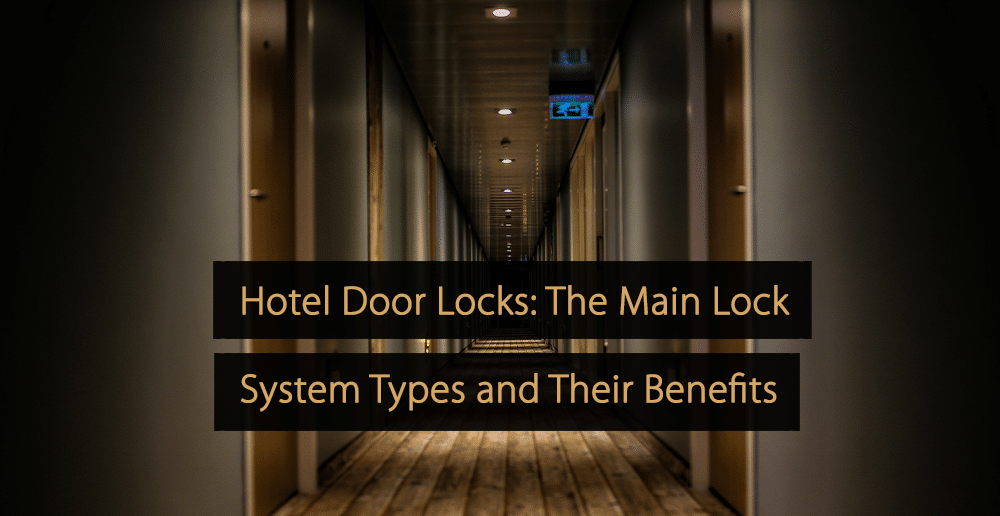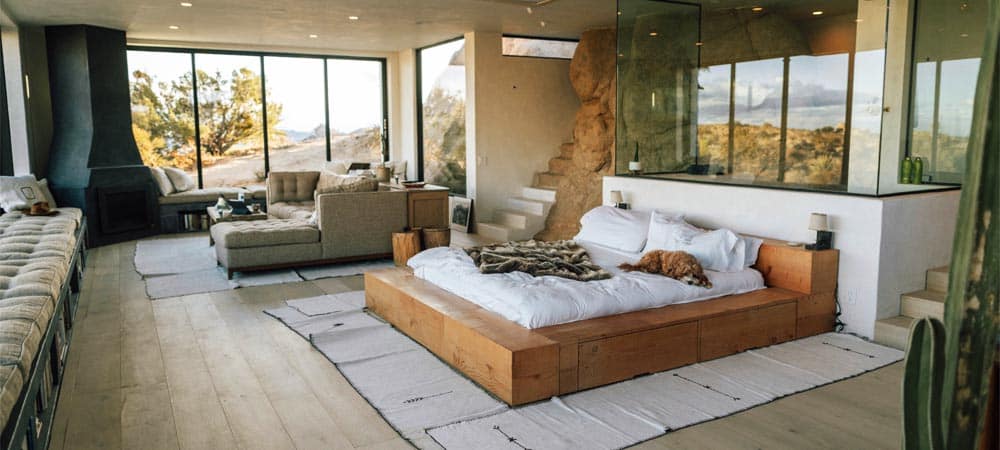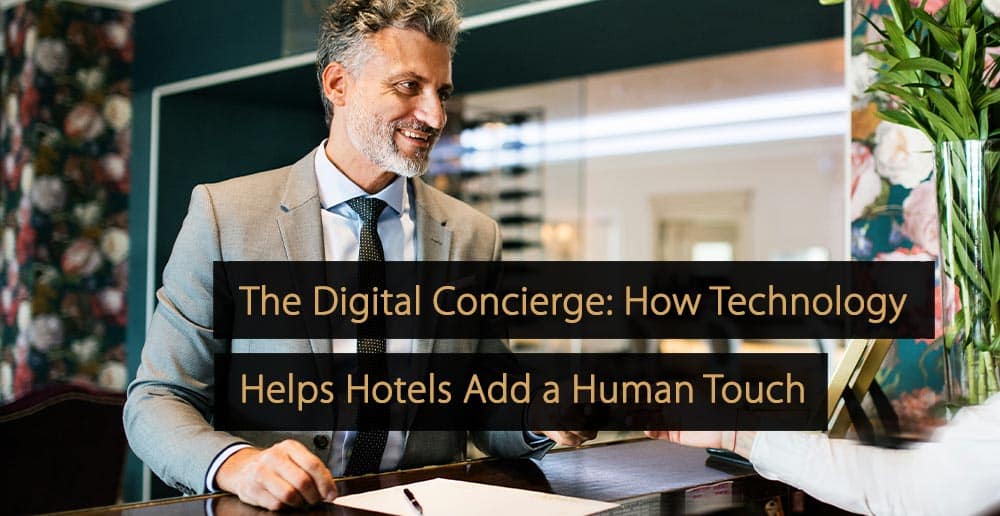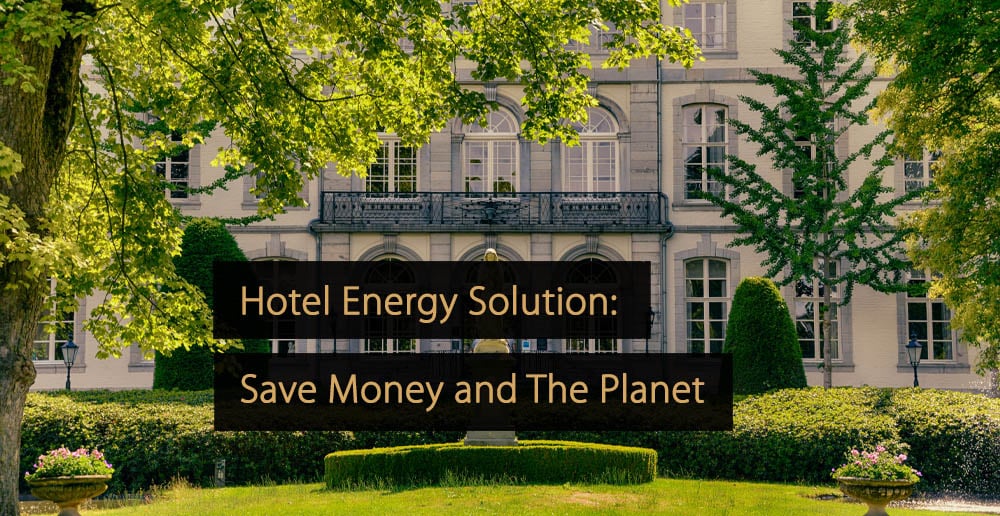Hotel door locks are one of the most important considerations when providing security for a hotel and keeping guests safe. There are many different locking systems to choose from and your decision needs to factor in the benefits and drawbacks. On top of this, you also need to have an awareness of relevant building and safety regulations. In this article, you can learn about the main hotel door locks, how they work, and what they offer.
Table of Contents:
- What is the Hotel Industry?
- Understanding Hotel Door Locks
- Hotel Door Locks: Rules and Regulations
- Types of Hotel Door Locks
- Factors to Consider When Choosing Your Hotel Door Locks
- How Long Will Your Hotel Door Locks Last For?
- The Main Types of Hotel Rooms
- Creating ‘Smart’ Hotel Rooms
What is the Hotel Industry?
Hotel door locks are security features used throughout the hotel industry, but what is this industry, and how is it defined? While the name may imply that it relates solely to hotels, the hotel industry covers all businesses providing short-term, paid, overnight guest accommodation and related services.
Ultimately, this means the hotel industry includes all forms of hotels, resorts, motels, inns, serviced apartments, holiday cottages, bed and breakfasts, hostels, guest houses, and more. Any business offering temporary guest accommodation is included. However, long-term and permanent accommodation is not included.
In the article “Hotel Industry: Everything You Need to Know About Hotels!“, you can dig deeper into this topic, access a comprehensive definition of the hotel industry, learn how it differs from the hospitality industry, and access a breakdown of the main types of accommodation that are included under most accepted definitions.
Understanding Hotel Door Locks
A hotel door lock system is a system that is made up of door locks, keys or keycards, and various other security tools or systems that can be used to restrict access to different areas within a property, including hotel rooms.
In the past, most hotel door locks were a relatively simple mechanical lock and physical key system; some hotels still use this approach. However, it became increasingly common to see hotels with electronic locking systems over time. These are still widely used today and often use electronic keycards instead of physical keys.
For convenience, many hotels implement mobile app-based locking systems, while some use biometrics to connect rooms to specific individuals. PIN systems sometimes protect employee-only areas, and some properties use a combination of different hotel locks.
Hotel Door Locks: Rules and Regulations
There are a number of rules and regulations surrounding the use of hotel door locks. In the sections below, you can learn about some of these regulations and ensure your property is safe and suitable for hotel guests.
Entrances and Exits
In many countries, strict regulations surround hotel door locks on doors used to evacuate the property. These doors should be able to be unlatched from the inside of a property, quickly and easily, using a single motion. It must not be necessary to use a key, keycard, biometric system, PIN, or other similar method to unlock the door from the inside. The method for opening the door should also be obvious and should involve minimal effort.
Hotel Guest Rooms
Guest rooms should be fitted with high-quality hotel door locks, providing guests with privacy and security. Locking systems vary, but the door should be easy to open from the inside, even if it is locked to those outside the room. Ideally, using a key or keycard should not be necessary to open the door from the inside. Doors must also meet necessary fire requirements, preventing smoke and flames from spreading in the event of a fire.
Doors Between Adjoining Guest Rooms
In some properties, adjoining hotel rooms may be connected by a doorway. The doors used for this are called communicating doors, because two doors are fitted into a single door frame, swinging in opposite directions. These doors need to meet fire regulations, but they are not necessarily required to be self-closing like other fire doors. Appropriate hotel door locks should be fitted and accessible from the room side of each door.
Meeting and Function Rooms
Doors leading out of meetings, conferences, functions, or assembly rooms that hold 50 or more people should either be fitted with panic bars or not have hotel door locks or latching systems. This allows people to quickly exit the room, even when people may be panicking and struggling to leave, such as in the event of a fire. These rules also apply to any room between the room in question and public spaces in the hotel.
Swimming Areas
Any enclosed swimming areas need to have appropriate doors, which should be easy to open from the inside. Depending on how many people can access the area, it may be necessary to install panic bars on the doors too, as this allows people to exist easily in a crisis situation. On top of this, doors should also have hotel locks or an appropriate mechanism to stop children from entering the area unattended.
Stairwell Doors
Typically, stairwell doors are required to be fire doors and should meet the associated standards. Guests should be able to access public stairwells easily from all levels, which can be crucial in the event of a fire. You should not lock a door that forms part of a marked escape route. Stairwell doors should also meet stairwell reentry requirements.
Service Rooms and Storage Areas
Service rooms and storage areas should also feature doors with appropriate hotel door locks. These doors should be fully compliant with fire and emergency exit regulations. If the room forms part of an escape route, it may be necessary to fit doors with panic bars, allowing them to be easily opened in emergency situations.
Types of Hotel Door Locks
In the following sections, you will learn about the different hotel door locks and their pros and cons.
1. Mechanical Door Locks For Hotels
Mechanical hotel door locks are what many people would think of as conventional door locks. This kind of hotel door lock system will consist of a mechanical device that keeps a door closed until the release mechanism is activated. This could be through a physical key or another similar method.
There are a number of different types of hotel door locks that can be categorized as mechanical locks, with some of the main examples including mortise locks, bored cylindrical locks, pin-tumbler locks, and deadbolt locks.
Hotel owners and owners of smaller accommodation businesses may turn to mechanical locks because they are budget-friendly, easy to install, and easy for guests to understand. However, they may not be the most cost-effective approach in larger properties, and there are possible security issues, as many mechanical locks can be picked or forced open.
2. RFID Hotel Door Locks
Radiofrequency identification (RFID) hotel door locks use digital credentials stored within keycards. This then provides hotel rooms and other doors within a hotel with a keycard locking system, where a tap from a specific card will unlock a door, resulting in excellent convenience.
The basic underlying technology here involves using a reader on the door and digital credentials on each card. The card is held close to the reader, and the credentials are communicated through radio waves. If the credentials match the reader’s expectations, the card will successfully unlock the door.
RFID hotel keycards can be remotely deactivated by hotel staff, which is a useful safety measure in the event that a card is lost, stolen, or misplaced. Credentials can then be added to a new card. This approach is reasonably cost-effective and can assist with the guest experience, because the process for opening a door is easy to get to grips with.
3. Integrated Circuit (IC) Keycards
On a basic level, IC keycard systems work similarly to RFID hotel door locks. Again, guests use a keycard to unlock their hotel room door, but the underlying technology differs.
With IC keycards, a chip is fitted into a plastic keycard. Rather than tapping the card on a reader, the card is usually inserted into a slot on the door, or swiped along a slit. Access permissions are programmed into the card, so that the keycard given to each guest will only unlock their specific hotel room door.
This type of system is popular in small and budget hotels. IC keycard systems are relatively easy to implement. However, the swiping or insertion motion is often less reliable than RFID systems and other methods.
4. Magnetic Keycard Entry System
Magnetic keycard entry systems are another example of hotel door locks that are opened using keycards. In this case, each card contains a magnetic strip that holds the user’s credentials.
Upon arrival, guests receive a card containing their credentials, and the card reader responds to the correct credentials, unlocking the door. The system is easy to use, and cards can be set up to automatically expire at a fixed time.
One potential problem with magnetic keycards is that they are less secure than other key entry systems. Data can be stolen using relatively unsophisticated technology, and magnetic interference could potentially lead to data being wiped, preventing users from accessing their rooms.
Video: What is a Key Card System?
5. PIN Code Hotel Door Locks
PIN code hotel door locks are locks that open when the correct sequence of numbers is entered. The standard approach here involves providing guests with a sequence of numbers upon arrival. The sequence must be entered in the correct order, and when the number is input correctly, the door unlocks.
Numbers are typically entered using a keypad, although touchpad entry systems have also become common. The approach provides high security and can be cost-effective, but it is not always the best user experience.
The main plus point of this approach is the absence of a physical key or keycard. This prevents situations where keys are lost or stolen. However, a drawback is the fact that guests are required to remember their PIN. For this reason, many hotels only use PIN locking systems to protect staff-only areas of the hotel.
6. Mobile App-Based Hotel Door Locks
Mobile app-based hotel door locks have become increasingly popular in modern times, especially as most hotel guests are now frequent users of smartphones. The approach here is to provide hotel guests with a mobile app, which they can use to unlock their specific hotel room.
In many cases, smartphone-based hotel door locks are combined with contactless check-in systems. This provides a seamless check-in experience, where guests can check-in, find their hotel room, and unlock it without communicating with hotel staff, waiting in queues, or dealing with keycards or physical keys.
Depending on the system, mobile apps will unlock hotel rooms using either the hotel’s Wi-Fi or Bluetooth technology. Hotel rooms can be locked and unlocked remotely, even if the guest is not directly in front of their room. While it is an advanced method most suitable in tech-driven hotels, it provides excellent convenience.
Video: QR Code Bluetooth Smart Password Lock RFID Card Key Smart Hotel Door Lock System
Factors to Consider When Choosing Your Hotel Door Locks
Several factors must be considered when deciding on the hotel door locks to use on your property.
Safety and Security
The single most important consideration is safety and security. You need to ensure the locks you choose are dependable and provide guests with the security and privacy they need. Focus on solutions that will reliably provide access to people with the right credentials and keep out those who do not have these credentials.
At the same time, you will need to ensure the locking systems you select adhere to safety and fire regulations and that the locks are not too complicated or detrimental to the overall guest experience.
There needs to be a continuous process of assessing the safety and security of your hotel locks and taking any necessary steps to improve or replace them. When changing a hotel door lock system, it is important to ensure you are not downgrading or compromising the security and safety of your property in the process.
Budget and Cost
Next, you need to consider the budget available to your hotel and the costs associated with different hotel door locks. It is important to understand that the difference in cost between different locking solutions can be significant, especially when the lock system will be used throughout a large hotel.
Calculate your budget carefully and explore the different options available. Ultimately, you are going to need to find an option that is affordable, but which also offers the best qualities in other areas.
You should explore different brands and suppliers, too. Some hotel door lock systems are more expensive than others, even using the same basic technology. Within this equation, you must think about quality, because a low-cost option can soon become much less cost-effective if it needs to be replaced or fixed.
The Guest Experience
Finally, when selecting the right hotel door locks, you should consider the guest experience carefully. How easy is the door lock to use? Will it be immediately obvious to guests how to access their room, or will the system need to be explained? How convenient is the locking system, and are there any potential problems or drawbacks?
During this stage, you might also want to consider the rest of your hotel offerings and choose the best locking system. For instance, if you are promoting yourself as a smart hotel, using a mobile app-based or at least an electronic solution makes sense, rather than an old-fashioned mechanical lock.
Ideally, you want to find a solution that delivers great convenience and where any issues are minimized. Remember, resolving problems with locks can take up valuable time and can lead to guests getting a poor first impression of your hotel.
How Long Will Your Hotel Door Locks Last For?
A significant consideration with hotel door locks is the length of time they will remain useful. As a general rule, most good hotel locks should last for at least five years, and a 10-year lifespan should be achievable in most cases, with regular maintenance, unless there is direct sabotage. However, the lifespan of your hotel locks may differ from this, depending on the type of lock and how well you can maintain them.
The Main Types of Hotel Rooms
Much like with hotel door locks, hotel rooms come in different forms. Rooms are sometimes categorized according to the layout of the room (e.g., honeymoon suites, studio rooms), the level of occupancy (e.g., single room, double room), or the type of bed in the room (e.g., queen room, king room).
In the article “Types of Hotel Rooms: The Different Hotel Accommodation Types”, you can learn everything you need to know about the range of hotel rooms and how these different categories are helpful to guests and hoteliers.
Creating ‘Smart’ Hotel Rooms
A high-quality, technology-driven hotel door lock, such as a mobile app-based system, can be a key part of turning a basic room into a smart hotel room. However, there are other crucial features to focus on, including smart control systems, voice-activated technology, and in-room personalization.
In the “7 Ways to Transform a Hotel Room Into a Smart Room” article, you can access a list of seven key ways to transform a hotel room into a smart one and better understand the benefits.
Hotel Door Locks FAQs
Hotel door locks are vital in hotels and similar guest accommodation businesses. Each hotel door lock system must be appropriate for the door on which it is fitted and in keeping with regulations. Various lock types are available, and your choice will likely depend on your budget and the guest experience you want to provide.
More Tips to Grow Your Business
Revfine.com is the leading knowledge platform for the hospitality and travel industry. Professionals use our insights, strategies, and actionable tips to get inspired, optimize revenue, innovate processes, and improve customer experience.Explore expert advice on management, marketing, revenue management, operations, software, and technology in our dedicated Hotel, Hospitality, and Travel & Tourism categories.
This article is written by:
Hi, I am Martijn Barten, founder of Revfine.com. With 20 years of experience in the hospitality industry, I specialize in optimizing revenue by combining revenue management with marketing strategies. I have successfully developed, implemented, and managed revenue management and marketing strategies for individual properties and multi-property portfolios.










Leave A Comment